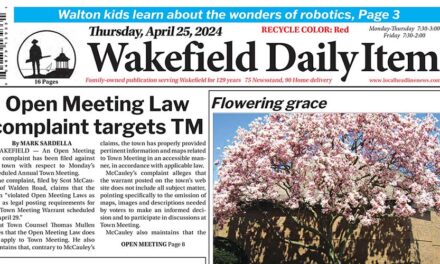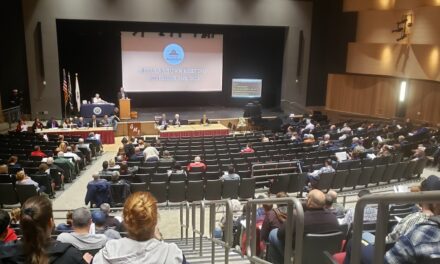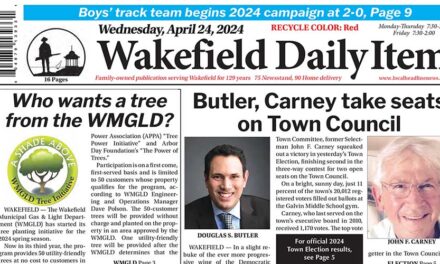Published in the April 13, 2018 edition.
By MARK SARDELLA
WAKEFIELD — The next Superintendent of the Wakefield Public Schools was in town Tuesday night, as the School Committee interviewed the three finalists for the position in a marathon public session.
Wakefield’s current Superintendent, Dr. Kim Smith, has announced her intention to retire on June 30.
The three finalists survived a process conducted by a screening committee of educators, local officials and citizens that reviewed the resumes of 28 applicants. They winnowed the number down to 10 and interviewed six before recommending the three finalists to the School Committee.
The finalists were interviewed in successive one-hour blocks set aside within Tuesday’s School Committee meeting. Leading off was Douglas Lyons, Wakefield’s current Assistant Superintendent. Next was Dr. Susan Kustka, Assistant Superintendent of the Weymouth Public Schools, followed by Jared Fugoni, Assistant Superintendent of the Haverhill Public Schools.
Individual School Committee members in turn posed the same questions to each candidate.
By way of background, Lyons said that he graduated from Massachusetts Maritime Academy with a degree in Marine Engineering before serving in the Military Sealift Command for seven years. Wanting a career change, Lyons took a teaching job at Bridgton Academy in Maine. After three years, he moved back to Massachusetts, taught high school math and got a graduate degree at Simmons College. He was the principal at Reading’s Parker Middle School before he was hired at Wakefield’s Assistant Superintendent three years ago. He is currently a doctoral candidate at Northeastern University.
Asked how he would handle different stakeholder groups, including unions, Lyons said his experience in Wakefield in collective bargaining and working with union leaders on a variety of issues has taught him the importance of forging relationships and finding middle ground.
As to how he would plan for leaner budgetary times, Lyons admitted that the financial support that Wakefield Public Schools have received over the last five years is not sustainable, but he said that the correction that the schools got several years ago in the form of a one-time influx of funds was necessary. Lyons said that it will be challenging to look at cost-saving measures going forward while maintaining a school system that attracts educators and new residents.
Lyons told the School Committee that he believed that he had a lot to offer as the next Superintendent in terms of continuity and leadership and said that he was excited to grow the relationships he has started. He said that the school district is “right where it needs to be” now but is also at a point where practices and goals need to be refined for the next five years.
Kustka said that in her 24th year in education she was “still incredibly passionate about working with children,” even though as an administrator her role is more one of supporting teachers and staff to help them to better support students.
She cited her varied experience in special education, as an elementary school teacher, building administrator, district coordinator and assistant superintendent for administration and personnel. She said that the variety of roles she’s played made her “incredibly well-rounded,” especially on the personnel side.
She said that she had forged strong relationships with collective bargaining units in Weymouth and had successfully negotiated contracts with unions.
When it comes to personnel, Kustka stressed that she is transparent with respect to her expectations, adding that “we’re all here because we care about children.” She said that the first question she always asks is, “How will this impact children?”
As superintendent, she said that she would advocate strongly for schools and for increasing the school budget. She said that in her current position she prides herself on having strong relationships with other town leaders like the Police Chief, Fire Chief and DPW head.
In terms of sustaining morale, Kustka said that as superintendent she believes in getting out and into all school buildings in the district and visiting classrooms on a regular basis. She also said that she intends to be visible at school events and engage often with parents and students.
Kustka said that Wakefield’s school budget is smaller than Weymouth’s so she was not concerned about that adjustment.
In closing, Kustka said that having worn many hats in her career has given her a broad understanding of the pieces that go into running a school district.
“I work hard, I put in a ton of hours and I’m always available,” Kustka said. “I take what I do very seriously.”
Fugoni said that he began his career in education as a teacher at a small school in New Hampshire before moving on to Moultonborough Academy. He said that his last 20 years have been in administration, working in small rural schools, suburban districts and large urban districts. He said that his experience has taught him the importance of being a strong collaborator and creating a culture where people feel passionate and inspired.
Fugoni said that in his current position in Haverhill he meets regularly and has a good working rapport with labor groups. He said that building those positive relationships creates trust that allows everyone to work toward shared goals.
In terms of building and sustaining morale, Fugoni said that when he first arrived in Haverhill he found a teaching staff with low morale. The teachers, he said, felt they were not getting enough time to collaborate. He offered, along with his administrative team, to take on bus duties, recess duties and cafeteria duties to give teachers time to meet together. As a result, he said, teachers “started feeling like professionals. When you build that culture, morale comes along.”
Asked about budgeting for lean times, Fugoni related a time when the Chapter 70 foundation budget was falling short. He said he pulled everyone together and did an audit of how money was being spent. He said that even if the savings were not huge, it showed the city’s financial people that a serious effort was being made toward efficiency.
Fugoni said that he believed that he was a good match for Wakefield and Wakefield was a good match for his collaborative leadership style. He said he would like an opportunity to help Wakefield continue to grow.




